#writing life
Text
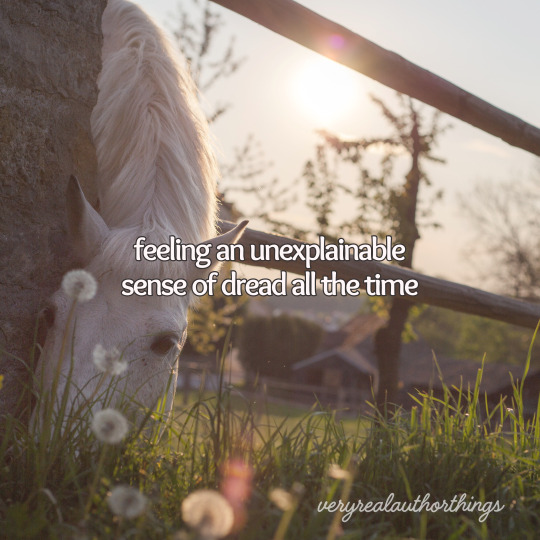
#writing#writing memes#writing life#writing community#author memes#writers on tumblr#author life#writers#meme#veryrealauthorthings#penny is dreadful
25 notes
·
View notes
Text
The Writing Profession's general attitude.

Me, a professional writer.

#writblr#writers on tumblr#writing community#writers of tumblr#writers on ao3#fanfic writing#fanfiction writer#fanfic authors#ao3 writer#writer#writers#writing#writers life#writing life#writing memes#writing meme#queue
22 notes
·
View notes
Text
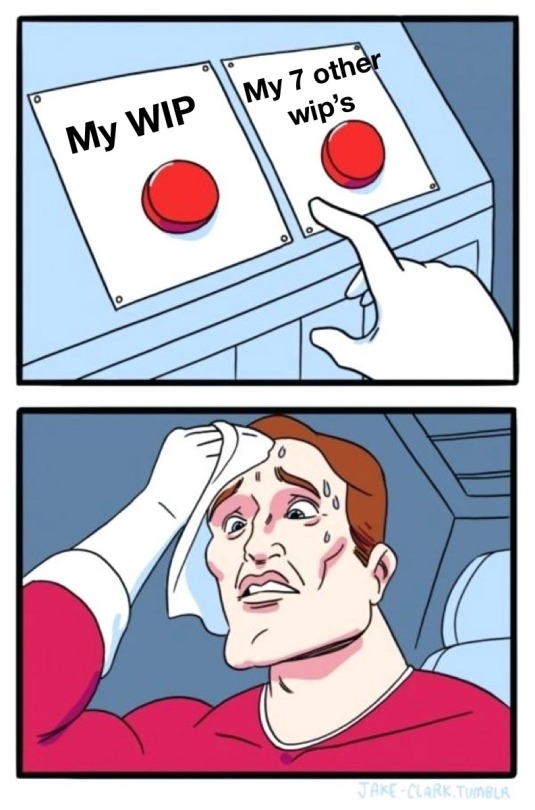
#writing#writeblr#writerblr#writers#writingblr#memes#writing life#fanfic#fanfiction#write#creative writing#fanfic writing
12K notes
·
View notes
Text
Words to Use Instead Of...
Beautiful
stunning
gorgeous
breath-taking
lovely
jaw-dropping
pretty
glowing
dazzling
exquisite
angelic
radiant
ravishing
excellent
ideal
sightly
wonderful
elegant
bewitching
captivating
mesmerizing
enthralling
magnetic
impressive
tasteful
charming
desirable
enchanting
Interesting
stricking
unusual
appealing
absorbing
srresting
gripping
riveting
alluring
amusing
exceptional
fascinating
impressive
provocative
prepossessing
exotic
readable
refreshing
entrancing
exceptional
Good
honest
upright
dutiful
enthical
pure
guiltless
lily-white
reputable
righteous
tractable
obedient
incorrupt
respectable
honorable
inculpable
irreprehensible
praiseworthy
well-behaved
uncorrupted
irreproachable
Awesome
wondrous
amazing
out-of-this-world
phenomenal
remarkable
stunning
fascinating
astounding
awe-inspiring
extraordinary
impressive
incredible
mind-blowing
mind-boggling
miraculous
stupendous
Cute
endeaing
adorable
lovable
sweet
lovely
appealing
engaging
delightful
darling charming
enchanting
attractive
bonny
cutesy
adorbs
dear
twee
Shy
modest
sel-effacing
sheepish
timid
way
reserved
unassured
skittish
chary
coy
hesitant
humble
introverted
unsocial
bashful
awkward
apprehensive
If you like my blog, buy me a coffee☕ and find me on instagram! 📸
#writer#writers#creative writing#writing#writing community#writers of tumblr#creative writers#writing inspiration#writeblr#writing tips#writers corner#writers community#poets and writers#writing advice#writing resources#writers on tumblr#writers and poets#helping writers#writing help#writing tips and tricks#how to write#writing life#let's write#resources for writers#references for writers#writers block#ao3 writer#writerscommunity#female writers#writer things
4K notes
·
View notes
Text
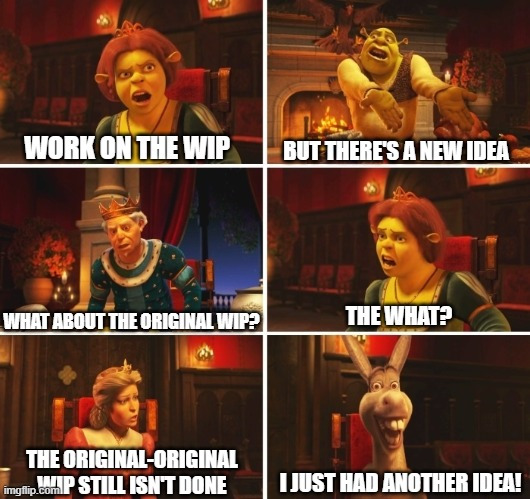
12K notes
·
View notes
Text
How To (Realistically) Make A Habit Of Writing
To clarify: Works with my autism. WORKS WITH MY AUTISM!!! I’ve been meeting my goals since I made them my New Year’s resolution! Anyway I’m so sick of all those ‘how to’ guides that don’t actually tell you what the process is they’re just like ‘just do it, but don’t burn yourself out, do what’s best for you!’ because you’re not telling me what I’m not supposed to be burning myself out over but okay, so I made my own. Hope this helps
1. Choose your fighter metric. What works better for you as a measurement of your progress; time spent writing or your word count? Personally I get very motivated and encouraged by seeing my word count go up and making a note of where it should be when I’m done, so I measure by that. At the same time, a lot of people are also very discouraged by their word count and it can negatively impact their motivation to write, and in that case you may be better off working from how much time you spend writing rather than where the word count is
2. Choose your starter Pokémon time frame. How often can you write before it starts to feel like a chore or a burden rather than something fun you look forward to? Many people believe that they have to write daily, but for some people this can do more harm than good. Maybe every two or three days? Weekly? Figure out what fits your schedule and go with it
3. Choose your funny third joke goal. Now that you’ve got your chosen time frame to complete your goal in, what’s a reasonable goal to aim to complete within that time frame based on the metric you chose? If your metric is your word count, how much can you reasonably and consistently write within your chosen time frame? If your metric is time spent writing, how much time can you reasonably and consistently spend writing within that time? Maybe 1000 words per week works, or maybe 10 minutes per day? The goal here is to find something that works for you and your own schedule without burning you out
4. Trial and error. Experiment with your new target and adapt it accordingly. Most people can’t consistently write 1667 words per day like you do in NaNoWriMo, so we want to avoid that and aim somewhere more reasonable. If you feel like it’s too much to do in such a short time frame, either give yourself less to do or more time to do it in. If you find yourself begrudgingly writing so often that it constantly feels more like a chore than something fun, maybe consider adapting things. And if you think that you gave yourself too much wiggle room and you could do more than this consistently, give yourself more of a challenge. Everything needs to suit you and your pace and needs
5. Run your own race. Don’t feel like you’re not accomplishing enough in comparison to others or not working fast enough to satisfy some arbitrary feeling of doubt. Everybody works at their own pace and slower work doesn’t mean worse work. You could be on one word per day and you’ll still see consistent results, which is still one word per day more than you could originally count on. All progress is progress, regardless of its speed
#habits#writing habits#writing#writers#writeblr#bookblr#book#writers on tumblr#writerscommunity#my writing#writers of tumblr#writer#how to write#on writing#creative writing#write#writers and poets#writblr#writer things#writing tips#writerscreed#writing is hard#writing advice#writing life#writer problems#writer stuff#female writers#queer writers#writersnetwork#writerblr
1K notes
·
View notes
Text
How to make your readers Feel emotions for Dummies
(Horror edition!) aka Make your readers Tense.
Anyway, you want to know how to make your readers angry or tense? Well... have I got some useless tips for you!
First, think about what would make you tense?
Usually, you will write about things that you enjoy, therefore your readers will most likely be similar to you, so you should take your own experiences within media and just... steal them
2. Second, Use short sentences, and add onomatopoeia
Nobody likes having to make their brain work faster. And shorter sentences will actually do that. So using it is very helpful.
For example: Nothing in the house made a noise except for something dripping from the ceiling.
Vs
Nothing in the house moved. Not a noise could be heard. Not even the rustle of wind against the walls, or even her own breath. Save for one thing. Drip, drip, drip. Something falling slowly from the rafters overhead. Then, she knew.
See? Better!
3. Next, you should make sure to dance around the word was
Trust me, it just adds that much more oomph
4. Underdescribe the important shit, Overdescribe the unimportant stuff
I don't have an example for this... uh... have a nice day
5. Make your protagonist likable
Please
6. Show your readers early on you won't hesitate to do something shitty
Like kill off a protagonist who didn't actually matter, do something drastic in the story that shows your readers you aren't fucking around
Good Luck and good day!
#creative writing#fiction writing#writing community#writer things#writerscommunity#writers on tumblr#writeblr#writing#writers#writers and poets#write#how to write#writer#writing life#author#writers block#writer stuff#on writing#writing tips#writing advice#writing help
2K notes
·
View notes
Quote
A non-writing writer is a monster courting insanity.
Franz Kafka
#writing#writers#write#writing tips#writing quotes#writing advice#amwriting#writing life#writeblr#quote#quotes
3K notes
·
View notes
Text
Do you ever just look at your characters and go what little weirdos. I love you so much. I’m going to put you through hell, but dang if you didn’t help pull me out of mine. I would do anything for these little spitfires who live in my brain.
#writer problems#writing#writers on tumblr#creative writing#writeblr#writing life#writing memes#writing community#on writing#writer memes#writerscommunity#writers and poets#writerslife#writer things#writers of tumblr
4K notes
·
View notes
Text
Old money names
For girls:
Adelaide - Meaning "noble and kind".
Beatrice - Meaning "bringer of happiness".
Cecilia - Meaning "blind" (associated with the patron saint of music).
Dorothea - Meaning "gift of God".
Eugenia - Meaning "well-born" or "noble".
Florence - Meaning "prosperous" or "flowering".
Georgiana - Meaning "farmer" or "earth worker".
Henrietta - Meaning "ruler of the home".
Isabella - Meaning "pledged to God" or "devoted to God".
Josephine - Meaning "God will add" or "God increases".
Lavinia - Meaning "purity" or "woman of Rome".
Matilda - Meaning "mighty in battle".
Octavia - Meaning "eighth" or "born eighth".
Prudence - Meaning "cautious" or "wise".
Rosalind - Meaning "pretty rose".
Seraphina - Meaning "ardent" or "burning one" (associated with the highest order of angels).
Theodora - Meaning "gift of God".
Victoria - Meaning "victory" or "conqueror".
Winifred - Meaning "blessed peace" or "joy and peace".
Penelope - Meaning "weaver".
For boys:
Archibald - Meaning "genuine and bold".
Bartholomew - Meaning "ploughman".
Cedric - Meaning "bounty" or "generous".
Desmond - Meaning "one from Desmond" or "gracious defender"
Edmund - Meaning "fortunate protector".
Franklin - Meaning "free landowner" .
Gregory - Meaning "watchful" or "vigilant".
Harrison - Meaning "son of Harry".
Ignatius - Meaning "fiery" or "ardent".
Jasper - Meaning "treasurer" or "bringer of treasure".
Leopold - Meaning "brave people" or "bold for the people".
Montague - Meaning "pointed hill" or "sharp peak".
Nathaniel - Meaning "gift of God" or "God has given".
Orville - Meaning "golden city" or "gold town".
Percival - Meaning "pierce the valley" or "piercing one".
Reginald - Meaning "counsel power" or "ruler's advisor".
Sebastian - Meaning "venerable" or "revered".
Theodore - Meaning "gift of God" or "God-given".
Victor - Meaning "victor" or "conqueror".
Winston - Meaning "joyful stone" or "joyful town".
If you want to read more posts about writing, please click here and give me a follow!

#writerscommunity#writers#writer things#writersociety#on writing#writblr#writers on tumblr#creative writing#writeblr#writing#writings#writers and poets#writer#write#writer problems#writerslife#ao3 writer#writers block#writing life#writing stuff#writing tools#writing community#writing tips#writing advice#writing prompt#writing inspiration#name ideas#old money#name suggestions#names
990 notes
·
View notes
Text

#this is targeted#writing#writing memes#writing life#writing community#author memes#writers on tumblr#author life#writers#meme#veryrealauthorthings#미친#fanfic writers#a03 writer#on fanfiction#archive of our own#dead dove do not eat
21 notes
·
View notes
Text
Showing when writing: Emotions [part 1]
Embarrassment
blushing
fidgeting
sweating
hiding their face in their hands
wide eyes
crossing their arms around their body
stutters
stammering
shifting their weight from side to side
exaggerated movements
nervous quirks appear such as picking at their nails, playing with their hair, and rocking on their heels.
avoiding eye contact
glancing or staring at random objects
stiff smiles
scratching the back of their head or neck.
subject changing
forced laughter
Anticipation
big smiles
wetting their lips
energized
constant movement
grinning
can't concentrate
clumsiness
fidgeting
questions
Awe
frozen
wide eyes
slack jaw
harsh or erratic breathing
grinning
staring
Surprise/shock
gasping
open mouth
slack jaw
wide eyes
covering their mouth with their hands
raised eyebrows
frozen
staring
stepping back
stutters or stammers
Triumph
Tilting back head and yelling out
fist pumping in the air
Jumping
Roaring
Whooping
laughter
bright smiles
grinning
Anger/Threatening
Shaking fist
Pointing
crossed arms
glares
frowning
scowling
Stabbing with finger
Slamming fist against something
Veins throbbing
Jutting out their chin
Clenched fist
Clenched jaw
flushed face
Eyebrows lowered or furrowed
squinting
Teeth bared
Wide stance
Tight-lipped smile
Rapid breathing
Sweating
aggressive stance
Flared nostrils
Puffed chest
loud voice
Nervous
lip biting
biting nails
blinking
tears
stepping back
awkward laughter
clumsiness
dry lips
dry mouth
fidgeting
darting eyes
wrapping their arms around themselves
repeatedly folding and unfolding their arms
clutching at themselves, their hip/shoulder/stomach
drawn in/furrowed brows
avoiding eye contact
jittery
pitched voice
no appetite or nervous eating so a bigger appetite
pacing
toying with things
restless
bouncing leg
rubbing at their face
scratching
sweating trembling
Hey there! I'm excited to share with you a new series I've created on Show Don't Tell. In this series, I dive deep into each emotion individually and provide a detailed list of ways to show it through body language, action, setting, and more. The first emotion we're exploring is Envy, and I promise you won't want to miss it! Check it out and let me know what you think. And if there's an emotion you'd like me to cover next, don't hesitate to leave a suggestion in the comments. Can't wait to hear from you!
#writing inspiration#writing#writers on tumblr#creative writing#writers#writeblr#writing advice#writing community#writing exercise#writing tips#writerscommunity#writerslife#writersociety#writer problems#writerblr#aspiring author#author#writers of tumblr#writing life#writers community
10K notes
·
View notes
Text
WHY IS WRITING IS SO FUCKING HARD?
Ten types of fuckery that stop you from writing the thing:
1. Imposter syndrome
You think you're not good enough or everyone else is better than you and you're just winging it AKA ye olde imposter syndrome bullshit. Yeah nah you're fine. No really, you're exactly where you need to be right now, and you'll keep getting better and better so long as you don't stop. Chances are, if you're filled with doubt about your abilities it means you've actually improved to the point where you can really start to understand what makes good writing. It means you know where you wanna end up and goshdarn it you're gonna get there.
Read this: 4 tips to kick imposter syndrome in the face and also genitals
And also this: How to silence the inner critic
2. Fear of rejection and/or failure
Yeah, us too. It fuckin sucks. BUT. Not all rejections are equal. And rejection is a necessary part of the process. Sometimes it takes a rejection to realise that a story isn't ready. Sometimes a rejection is entirely subjective and has ZERO reflection on the quality of your work. But shying away from the very idea of possibly maybe hypothetically getting rejected is only going to hold you back from even trying. And knowing why you got rejected and how to learn from it is one of the most valuable writing skills.
Read this: The different types of rejection (and how to deal with 'em)
Then read this: How to cope with rejection
And also this: Writing lessons from Groundhog Day
3. Not enough planning / too much planning
Leaping into a new story with nothing but a glimmer of an idea is exciting as heck (and can sometimes be a great way to begin) but at some point you're gonna need some sort of outline or plan to keep you on track. HOWEVER. Planning your story to within an inch of its life can also sometimes be a hindrance - leaving you stuck in the hypothetical stage of the process where your story doesn't quite exist yet (and therefore avoiding the prospect of it sucking). The sweet spot is in the middle. Having just enough of a plan to know where tf you're going, but enough freedom and flexibility to let the story lead the way...
Read this: Planning vs pantsing
Then read this: Five plotting techniques
And also this: The perils of overplanning
4. Your WIP just isn't working
Sometimes things just fall flat. Sometimes you work on the same story for yeeeeears and then it just kinda... dies. Sometimes you have the best plans (see above) and the best intentions and things still don't work out. Sometimes it's just time to move on. And sometimes it's not! Sometimes a story can be revived, fixed or changed. Sometimes you just need time. Sometimes YOU'RE the one that's changed and this isn't the story you need to be writing right now. Many variables. Muchly personal. Read the things below for more advice cos this is a big question:
Read this: What to do when your WIP isn't working
And also this: Give it space - how to grow a story in your head
Or how about this? Editing 101
5. You keep deprioritising it
Ah the irony of writing being the thing you love/want to do most of all AND YET the thing you procrastinate over and avoid and shove to the very bottom of your to-do list all the freakin' time. Maybe it's the comodification of art destroying our freedom to create without pressure. Maybe it's late capitalism sucking up all our available time and energy. Maybe it's a lack of self-belief subconsciously telling us our 'little hobby' doesn't really matter. Maybe it's maybelline. Whatever it is, you have the power to reclaim and revalue your writing. To say, "I'm a fucking writer, goddamnit!" and mean it. To ringfence your creative time so nothing and nobody gets to interrupt it. To do that thing you love.
Read this: Prioritise your writing
Read this: How to write in 30 second bursts
6. Shiny Thing Syndrome
You know that feeling when you're just getting stuck into a writing project and then — SQUIRREL! — you get distracted by another, better, more shiny writing project? Or maybe you're deep in the editing phase and your current WIP just isn't feeling very shiny at all and pretty much ANYTHING seems more exciting? Or you simply can't decide which of the many squirrelly writing ideas to actually start? You, fine writerperson, may be suffering from Shiny Thing Syndrome (STS). But fear not! There are a few ways to combat it, depending on the cause, and most of them involve embracing the squirrel-brain and injecting a bit of fun into your writing, like so:
Read this: Shiny thing syndrome - a writer's malady
Aaaand read this: Get excited about your writing again
And also this: Write like a kid
7. Perfectionism/self-sabotage
Look. Writing is scary as shit. What if someone READS it? What if they don't like it? What if they see into your soul and gain a deeper understanding of you through your words? Writing your truth, being vulnerable, smearing your heart juice all over the page? No thank you. But also, that's where the good shit is, so actually yes please. Just make sure you smear responsibly. And rest assured, even the most 'successful' and experienced writers ALSO feel like this sometimes, so you're in good company. It's just part of the art, bruh.
Read this: Why writing is scary (and why that's a good thing)
Read this: Beginning a story - what stops us starting?
And also this: Get out of your own way
8. The dreaded blank page
Oh godddd the blank page. It should be an exciting palimseset of possibility but is somehow also the most terrifying thing known to humankind. You wanna write something but where to start? HOW to start? You type that first line and immediately delete it. You watch the cursor blinking at you—taunting you—until you just give up and shut your laptop again. It's probably tied up with a bunch of things we've already covered so far: perfectionism, imposter syndrome, fear of failure, maybe a lack of planning or faith in your story or whatever. But it doesn't have to be this way. A blank page IS exciting and full of possibility. We just have to get over ourselves and learn to embrace the unknown...
Read this: Don't fear the blank page
And also this: The moaning method
9. Not enough time/energy/motivation/gnuuuughh
Dude, same x 1000. But you don't have to get up at 5am, do hot yoga, drink a kale smoothie and write a thousand words before sunrise to be a Proper Writer. You don't even have to write every day. But what you can do is hack your writing brain and figure out when, where, how, and why you write most effectively. Then tweak your schedule, your habits, and your attitude to ensure you're making the most of your time. Productivity is a big ol' lie but finding the secret to getting in your own personal writing zone is actual MAGIC.
Read this: Maximise your writing time
And also this: Get in the writing zone
And also unto this: The Writers' HQ Guide to Productivity
10. You're just fucken stuck
Got the writing morbs? In need of some literary sudafed? Stuck as a pig in a poke? Writing is a whole puzzle of a process—and to be honest that's what makes it so fun and exciting and addictive, because your writing brain is hardwired to both create AND solve the wordy puzzles within your story. Sometimes the answer is time. Sometimes it's a second opinion or a fresh eye. Sometimes a totally different approach or just a hefty kick up the bum. But whatever the problem, there IS a solution. You just gotta keep going and trust that you'll find it...
Read this: Troubleshoot your writing - why are you stuck?
And also this: Break through the writing blockage
And also also this: Write yourself into a pit (and then dig your way out again)
~~~~~~~~~~~~~~~
Alright, that's it for today. Now go write, you flithy animals.
(And if we missed anything, stick a question in our ask box or check out the rest of our shit here)
#writing#writing advice#writers of tumblr#writeblr#writing community#writers community#writing life#creative writing#national novel writing month#nanowrimo#nanowrimo 2022#imposter syndrome#perfectionism#writer's block#writers block#writer things#procrastination#productivity#writer problems#blank page#the blank page#WIP#pantser#editing#plotting
8K notes
·
View notes
Text
The Character Arc: 101
As opposed to the plotline, the character is a description of what ahppens to the inside of the character over the course of the story.
Your lead character should be a different person at the other end of the arc.
The character has a build to it. It must, or the change will not be convincing. A good character arc has:
A beginning point, where we meet the character and get a sense of his interior layers (more on layers in a moment)
A doorway through which the character must pass, almost always reluctantly
Incidents that impact the layers
A deepening disturbance
A moment of change, sometimes via an "epiphany"
An aftermath
Layers of a Character
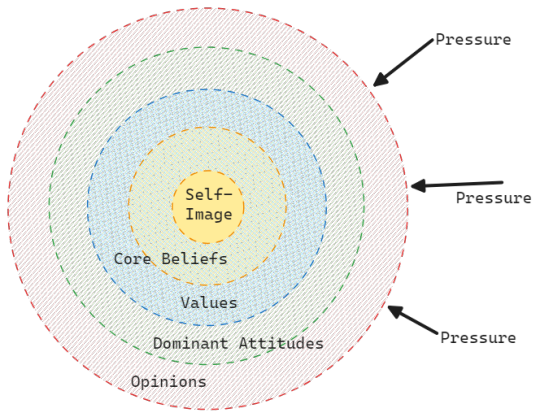
The layers get "softer" (easier to change) as you move outward. The point of the whole character arc is to crack these layers one by one with external pressure until the character changes in a major way.
As an example: Scrooge from <A Christmas Carol>?
Core Image = miser, misanthrope
Beliefs = pointlessness of charity
Values = money over people
Attitude = profit is more important than good works
Opinion = christmas is a humbug
The Beginning = The character is, well, what he usually is.
Impacting Incidents = There's pressure for the character to change.
it is best to underplay such moments.
Overdo it, and you will lapse into melodrama.
Deepening Disturbances = The initial "lesson" is followed up by an even more shocking pressure
Aftermath = There is an action which indicates that the character is changing, reacting to the external pressure.
The Epiphany = The big moment of change.
The Character Arc Table
List the impacting and deepening incidents in your novel in a table
Add the first (starting) and last (ending) points of your plot
Now, list how your character's inner world changes along with the external changes that take place.
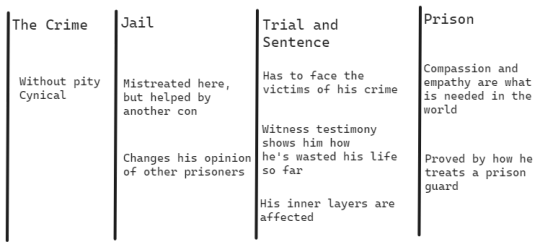
If you like my blog, buy me a coffee☕ and find me on instagram! 📸
#writer#writers#creative writing#writing#writing community#writers of tumblr#creative writers#writing inspiration#writeblr#writing tips#writers corner#writers community#poets and writers#writing advice#writing resources#writers on tumblr#writers and poets#helping writers#writing help#writing tips and tricks#how to write#writing life#let's write#resources for writers#references for writers#writer on tumblr#writer things#writer stuff#writer community#writer problems
2K notes
·
View notes
Text
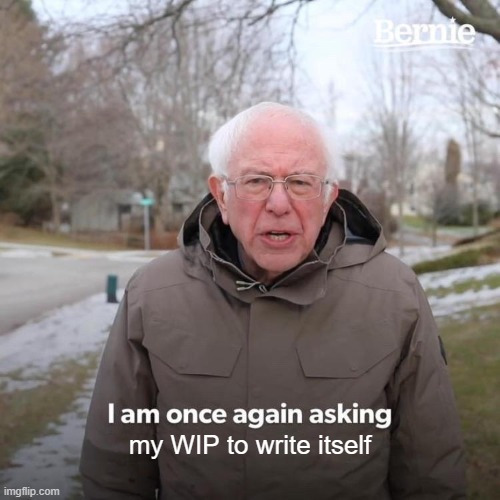
13K notes
·
View notes
